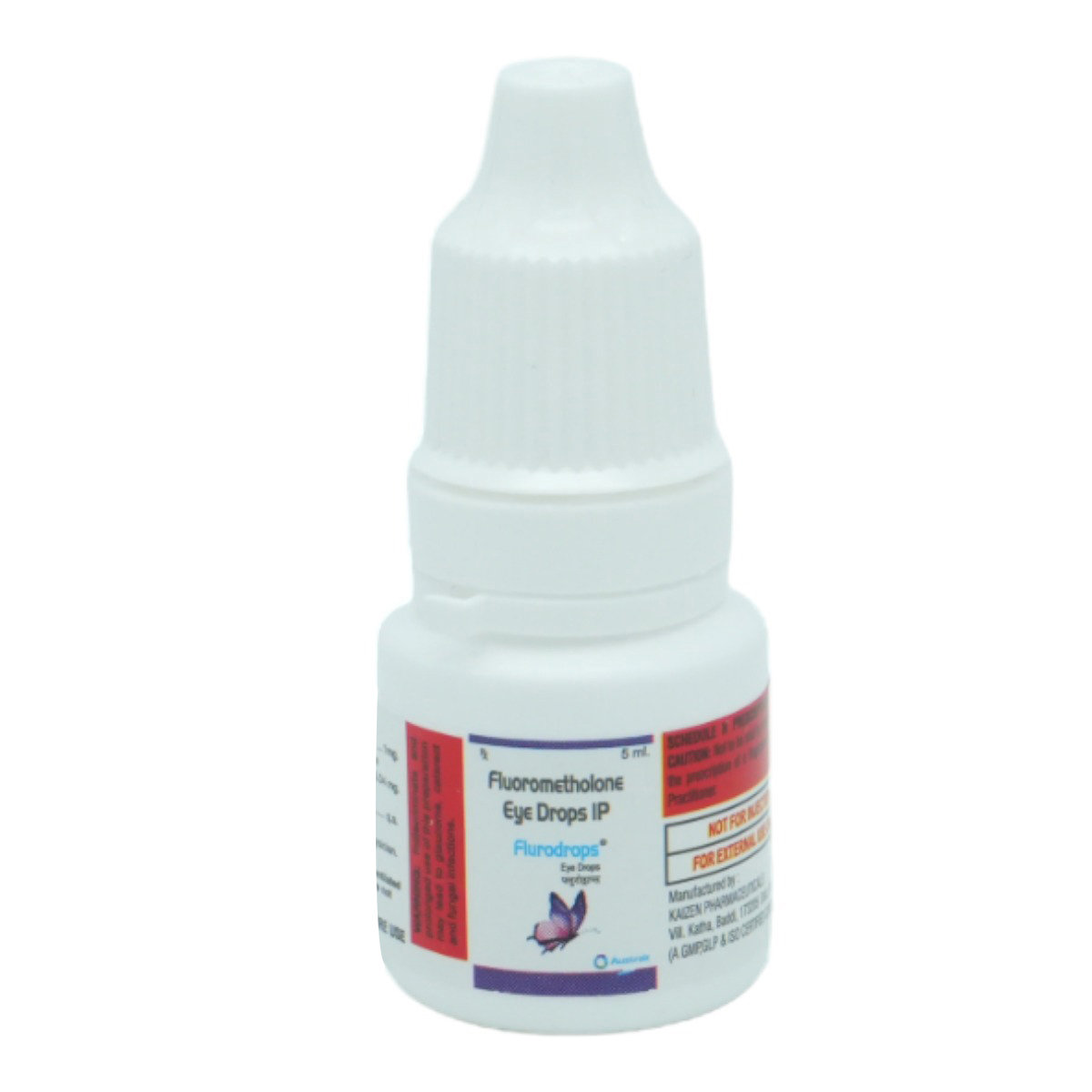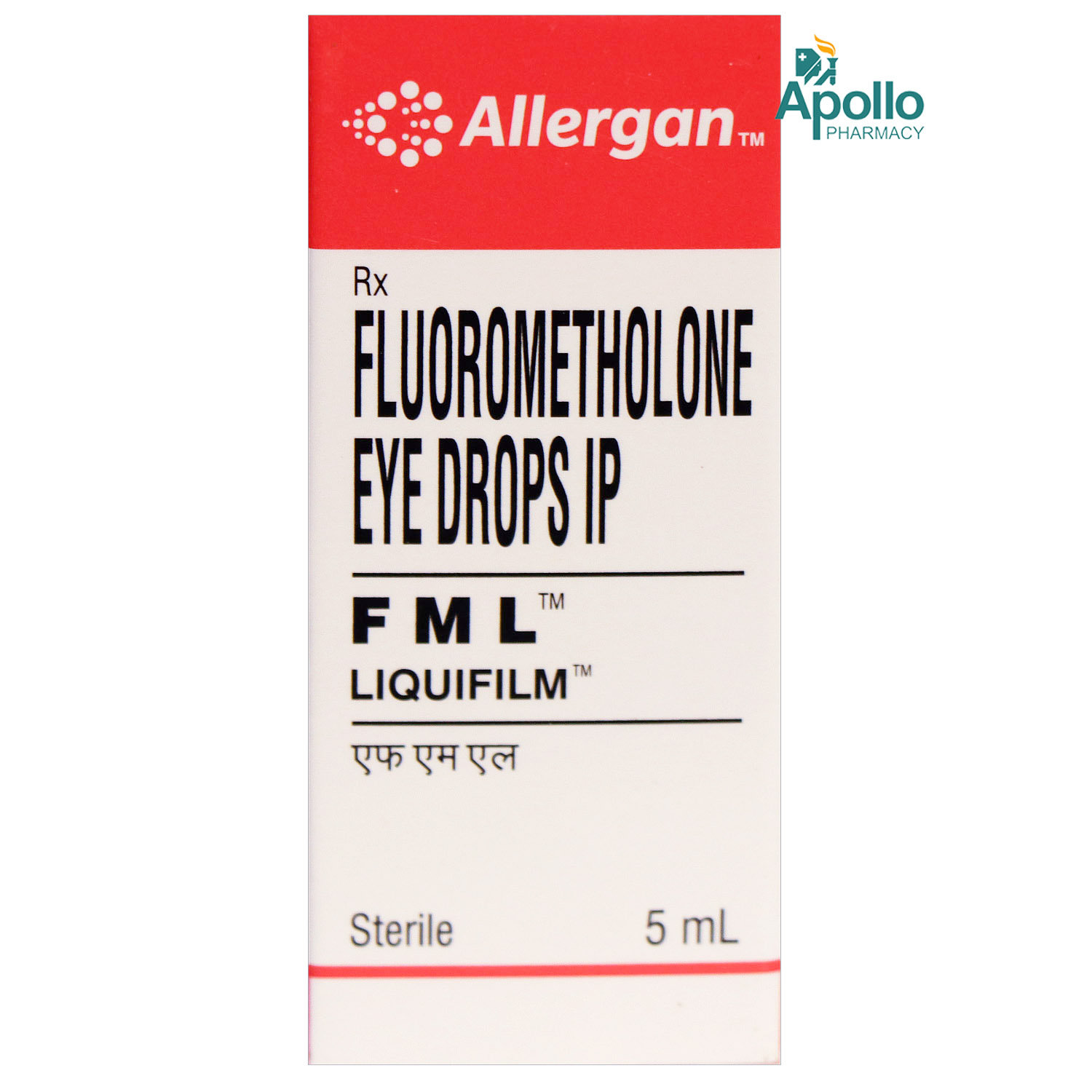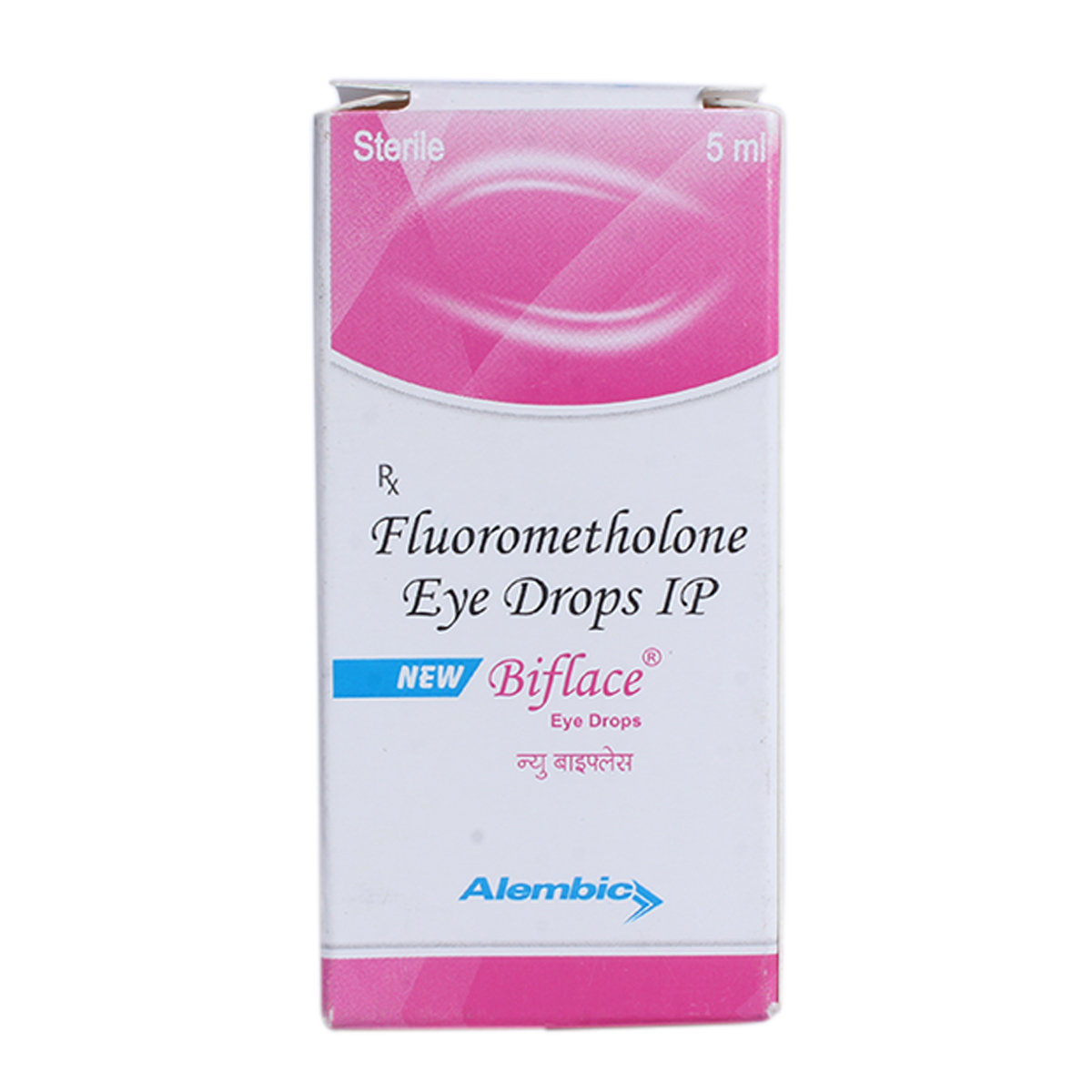Fluorometholone
About Fluorometholone
Fluorometholone belongs to the group of medications called ‘steroids’ and used to treat various eye conditions caused due to infection, inflammation, or injury in adults and children above 2 years of age. Eye inflammation is the swelling of eye tissue due to underlying conditions such as allergies, conjunctivitis (inflammation of the mucous membrane of the eye), or other eye disorders.
The Fluorometholone contains ‘fluorometholone’, which decreases the activity of the provoked immune system, thereby blocking white blood cells (WBC) from attacking our own body cells. This results in a decreased release of chemicals (prostaglandin) that cause pain and inflammation. It causes constriction of blood vessels decreasing the access of cells to the site of injury, and reducing the swelling, pain, and discomfort in the eyes.
Fluorometholone is only for ophthalmic use. You may experience a burning or itching sensation in the eye and blurred vision (when eye ointment is applied) after using this medicine. However, these effects are temporary. A common side-effect of Fluorometholone is increased pressure inside the eye. If you notice any persistent vision problems while using this medicine, consult your doctor immediately.
Do not take Fluorometholone if you are allergic to ‘fluorometholone’ or any other ingredients present in it. Check its contents before using, as it may contain ‘benzalkonium chloride’ and ‘phosphates’. Soft lenses may absorb benzalkonium chloride, so do not wear contact lenses while using this medicine. Besides, it may also cause eye irritation, especially in people with dry eyes or disorders of the cornea (the transparent layer that covers the front portion of the eye). Phosphates may result in cloudy patches on the cornea in people with corneal disorders. Before taking Fluorometholone, inform your doctor if you have any eye infections. Also, inform your doctor if you have glaucoma, herpes simplex (viral infection), and thin cornea as this medicine may worsen the condition. Do not use this medicine for more than 7 days unless prescribed by your doctor.
Uses of Fluorometholone
Medicinal Benefits
Fluorometholone contains 'fluorometholone' which belongs to the class of medicines called 'steroids'. It controls inflammation by acting on the immune system and decreasing the provoked immune system by blocking white blood cells (WBC) from attacking the injured site's cells. As a result, this reduces the release of chemicals (prostaglandin) that cause pain and inflammation in the eyes. It also causes constriction (narrowing) of blood vessels decreasing the access of cells to the injury site, which helps reduce the swelling, pain, and discomfort in the eyes.
Directions for Use
Storage
Side Effects of Fluorometholone
- Increased pressure inside the eye
- Vision problems
- Burning or stinging sensation
- Itchy eyes
- Increased tears
- Eye pain
Drug Warnings
Do not take Fluorometholone if you are allergic to ‘fluorometholone’ or any ingredients present in it. Inform your doctor if you have any bacterial, fungal, or viral eye infections. Inform your doctor if you have glaucoma (a condition with increased internal pressure in the eye), herpes simplex (viral infection), or thin corneal tissue, as this medicine may worsen the condition. Fluorometholone may delay your eye healing after cataract surgery, so if you have undergone any planned eye surgery, tell your doctor about this before using Fluorometholone. In some cases, Fluorometholone may increase eye pressure, so if you experience pain in the eye, immediately consult a doctor. Fluorometholone should not be used in the conditions of any eye infection.
Drug Interactions
Drug-drug interactions: No interactions found.
Drug-food interactions: No interactions found.
Drug-disease interactions: Fluorometholone should be used with caution in patients with glaucoma (increased internal pressure in the eyes), herpes simplex (viral infection), and cornea problem (the transparent membrane covering the eyes).
Drug-Drug Interactions Checker List:
Safety Advice

Alcohol
cautionFluorometholone may not interact with alcohol. However, alcohol may sometimes worsen the inflammation.

Pregnancy
cautionFluorometholone is a Category C medicine and it may cause harmful effects to the unborn baby. So, do not use this medicine in pregnant women unless prescribed by your doctor.

Breast Feeding
cautionFluorometholone should be used with caution in breastfeeding mothers.

Driving
cautionFluorometholone may cause temporary blurred vision after administering eye drops or ointment. So, wait for a few minutes or until your vision clears before driving.

Liver
safe if prescribedFluorometholone is safe if prescribed in patients with liver diseases.

Kidney
safe if prescribedFluorometholone is safe if prescribed in patients with kidney diseases.

Children
cautionFluorometholone should not be used in children below 2 years of age. For children, 2-12 should use only if the doctor has prescribed it.
Habit Forming
Diet & Lifestyle Advise
- Consume a healthy diet that contains vegetables and fruits, whole grains, nuts, high-quality fish, eggs, and dairy.
- Eat foods that are rich in antioxidants such as berries, prunes, apples, and artichokes.
- Do eye exercises if necessary. Your doctor is the best person to recommend eye exercises based on your condition.
- If you have pink eye or conjunctivitis, always wear sunglasses and do not contact other people to prevent the spread of infection.
Special Advise
- Fluorometholone may increase your eye pressure in some cases. So if you experience such signs and symptoms, immediately contact a doctor.
- If your eye pain and inflammation do not improve after 48 hours, consult an Ophthalmologists.
Patients Concern
Disease/Condition Glossary
Eye inflammation: It is the swelling of eye tissue due to underlying conditions such as allergies, conjunctivitis (inflammation of the mucous membrane of the eye), injuries, or other disorders of the eye. It is characterized by redness, watery or itchy eyes, and a burning sensation in the eye.
FAQs
Fluorometholone works by blocking the release of chemicals in the body that cause inflammation. It also narrows the blood vessels at the affected area decreasing the permeability of cells (including white blood cells) into the affected site, thereby decreasing swelling.
Fluorometholone is not recommended for use in patients with glaucoma as this medicine may worsen the condition by increasing the pressure inside the eye.
Fluorometholone may weaken the immune system. So, long-term or prolonged use of this medicine may increase the risk of infections.
If it is less than 2 hours since the missed dose, take the medicine. However, if it is almost time for the next dose, do not double the dose. Take the next dose as usual at the fixed time.
Fluorometholone may not cause vision problems. It may cause temporary blurred vision when eye ointment is administered in the eye.
Fluorometholone is a category C medicine, which may cause harmful effects to the unborn baby. However, your doctor may prescribe this medicine during pregnancy if the benefits outweigh the risks.






